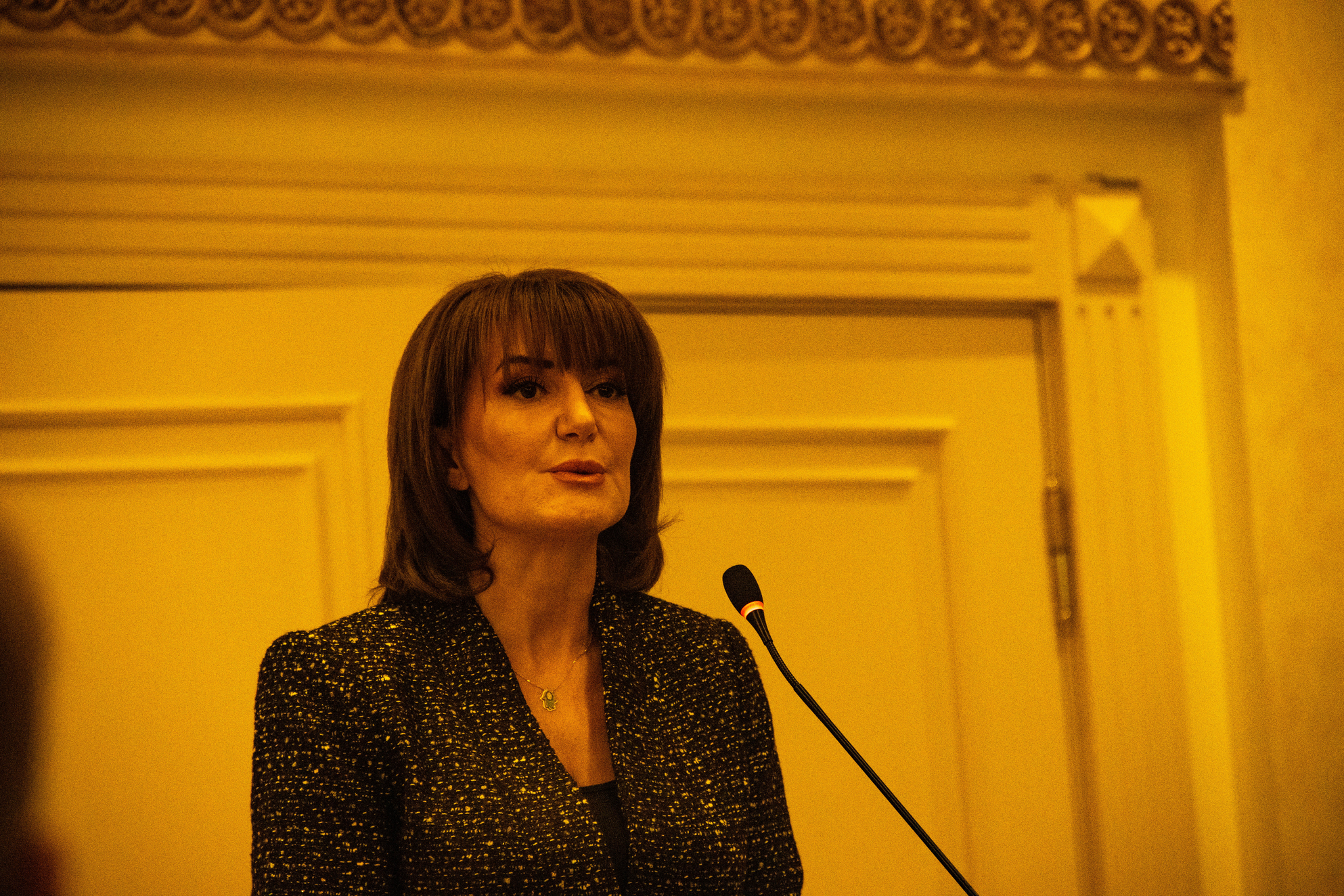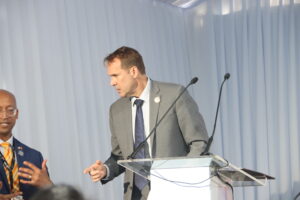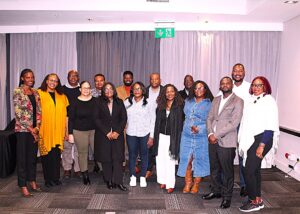…Jahjaga urges media to be responsible in portrayal of women
Silence Charumbira recently in Pristina, Kosovo
Freedom of the media and the safety of journalists are essential in societies that want to prosper, aspire to be just and to be guided by accountability, former Kosovo president Atifete Jahjaga has said.
But equally essential is ensuring that the media’s portrayal of women to avoid reinforcing stereotypes which ultimately undermines women’s contributions in different roles perpetuating a culture of discrimination.
Jahjaga was addressing journalists during a workshop organised by the European External Action Service of the European Union in Kosovo capital, Pristina, Thursday. It was attended by journalists from Africa, Middle East and Asia, Latin America, the Caribbean and the Balkans region of Europe among others.
The first female president of Kosovo said the media’s work was essential.
“It has been such in Kosovo’s not so short tradition of media pluralism that has defined our republic’s making and even now when we find ourselves as the only country in Europe that no longer has a printed newspaper.
“We are well aware and we should be reminded every day that Democracy has no chance to survive and no ability to thrive in information darkness. We have lived in one and we will never go back there again. A free and thriving press is a value – one of the greatest values I may argue – and we need strong willed, responsible journalists and editors in the newsrooms as we forge Kosovo’s way forward. They need to remind us of who we are and who we are committed to be and hold us to account every single day of how we are measuring up to our goal of being a free and fair country to all that call Kosovo their home. They need to inform the public of promises kept and promised unkept.”
She said media also had a role to create social and national cohesion by helping build a sense of community while also setting an agenda of priorities.
Considering the huge public trust vested in the media, it was also essential “for media to live up to their duty to serve the public’s right to know and to foster a fact-based conversation that keeps the institutions and the citizens at the receiving end of the decision-making engaged and responsible”.
“While this may have been a more straightforward matter in times of national tormet, during the Kosovo war, since its liberation Kosovo, like many democracies, has struggled to define these roles and responsibilities. We have seen institutions, both local and international, limit media’s access to information. We have seen them use and misuse national interest as a way to limit transparency, accountability and the public’s right to know. And we have seen that it has damaged all parties involved – it has weakened the political processes that are key to Kosovo’s future, it has shaken the trust in media and it has undermined the democratic progress.”
In her public engagement, Jahjaga said, she encountered frustrations with the ways the media characterised her presidency while her gender became a target. So bad was it that it felt personal, “but most times I worried about the repercussions it will have on the general portrayal of women in public office and the discouragement that comes with it”.
“We need to do our outmost to ensure the freedom of the media for it is essential, so that the information it disseminates is fact-based and reliable, so no hand or power should affect or try to affect the dignity of this institution. When I talk about the pressfreedom, I also emphasise their moral, professional and legal obligation to provide reliable news, deep and qualitative analysis, and especially the immediate avoidance and elimination of gender and sexist prejudices against all women who are part of public life.
“The portrayal of women belonging to public professions by the media is an area that requires our attention but also our criticism, focused on big and significant changes, despite the positive changes in some aspects of the functioning of the media, this area we can say that still leaves a lot to be desired for further improvements.
“As the first female president of Kosovo, I faced unique challenges in how the media portrayed my leadership. Local media coverage often focused more on my gender, my appearance, my private life than my policies. When I stop and reflect on my tenure, I cannot ignore the unfair and unprofessional treatment I have received from the media, and all of this treatment has come as a result of my gender identity, being a woman, and the President, for someone it was too much. Despite my dedication and raising the state of Kosovo to high pedestals, the country’s media focused on other aspects, such as my appearance or wardrobe.
“The media’s portrayal of women often reinforces stereotypes, affecting public perception and limiting women’s roles in politics and society. This not only undermines women’s contributions but also perpetuates a culture of discrimination. It’s crucial to address these biases to foster an inclusive society,” Jahjaga said.
She therefore learnt to engage with the media strategically, using interviews and press conferences to amplify her message while advocating balanced coverage of women in leadership.
But to understand the state of affairs, there was need to identify the challenges that the media faced, and comprehend that their struggles were many.
“Not only have media faced unprecedented challenges with the rise of social media and lately AI (artificial intelligence), which require them to constantly change and adapt to an ever shifting environment of wants and needs, but they are often a function of a market competition that is outside of their control.
“Yes, indeed, we often think of media as a public service, a right and a good which ensures that every citizen is informed if she or he chooses to, but in a free and open market, media are dependent on business models that could make them susceptible to influences that in the long-term undermine their objectivity, their impartiality and eventually the public’s trust.
“Some of these forces don’t have immediate fixes. They are part of a longer chain of events interlinked and interdependent that are tied to our ability to create stable economies and strong democracies that withstand the earthquakes of today’s rapidly changing world.
“But what we can do is to ensure that we – institutions, civil society and the public – do our outmost to ensure the freedom of the media, for it is essential, so that the information it disseminates is fact-based and reliable, so no hand or power should affect or try to affect the dignity of this powerful and key estate.
“When I talk about the pressfreedom, I also emphasize their moral, professional and legal obligation to provide reliable news, deep and qualitative analysis, and especially the immediate avoidance and elimination of gender and sexist prejudices against all women who are part of public life,”she said.
The fight for online traffic had also exacerbated the situation as media outlets were now negating the need for neither authenticity nor analysis. This, she said, was largely driven by financial reasons as many media had serious economic problems, “so they compete with each other as to who will publish the news first, without worrying about its content as well as professional and human ethics”.
“Disinformation, hyperbolisation of events, and the apparent decline in the quality of work are unfortunately characterizing journalism in Kosovo and beyond, and this is quite worrying.
“Yet I am optimistic for the fact that Kosovo enjoys a media pluralism with a variety of voices and figures heard on television, radio and other online platforms, which are owned by different entities, allowing room for independent reporting and a diversity of viewpoints.”
More from Africa News 24
SADC PF convenes retreat to strengthen budgetary practices for SRHR advocacy
The media has also been prone to the political polarisation and politicisation which have affected many different fields, people and professions.
To avert the situation, the media had to remain independent of external force and influence.
“In order to preserve their educational and sensitizing role, the media should be allowed to exercise their profession and their role unhindered. For its part, the media should also be committed to an ethical standard so that the dignity of each and everyone is preserved.”
Institutions must become more transparent and let media do their job. The media itself must do some soul-searching about their impact on the fabric of the society and perhaps rethink how they themselves could agree to hold themselves to an account through stronger self-regulation to ensure equitable representation and to challenge harmful narratives.
She said Kosovo faced significant challenges from foreign entities attempting to manipulate public opinion and destabilise its young democracy. It was therefore essential to educate the public about recognising misinformation and understanding the sources of their information. Supporting independent journalism and promoting fact-based reporting was vital in building resilience against external narratives that threaten our democratic values.
As one of the fastest and most important connectors, the media had the power to do great things and should use the opportunity “with honesty and dignity, with dedication”.
“There is nothing more important than being the eyes, ears and voice of the people, and you are, you have been given and have earned this opportunity, so that there is as little hesitation, threats and interference in your work as possible, let law, work ethic and professionalism be your guide,” she said.












